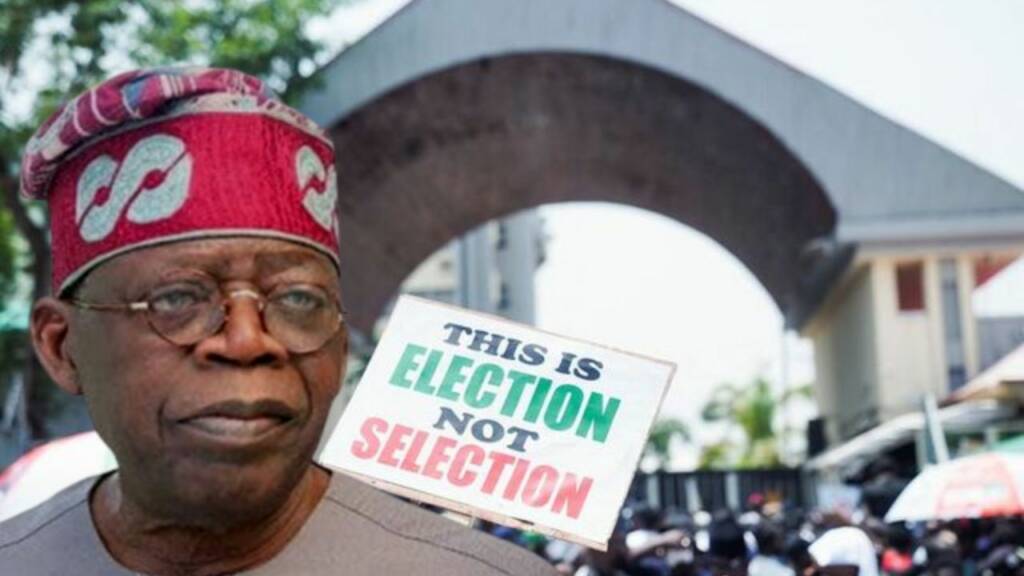Nigeria elections: When Nigeria transitioned from military to civilian rule in 1999, it marked the beginning of the longest continuous civilian rule since the country gained independence from colonial rule in 1960. This tradition has been observed annually since the year 2000.
In the recently concluded elections in Nigeria, Bola Tinubu emerged victorious, keeping the ruling party in power in Africa’s most populous nation. However, his victory also raised the specter of protests, and now a cloud of uncertainty and skepticism hovers over Nigeria’s election results, which is bound to dampen Tinubu’s election euphoria.
Nigeria elections: Scepticism & Uncertainty
As soon as Nigeria’s electoral commission released results on February 27, the country’s main opposition candidates had already demanded a re-vote, citing the ruling party’s early lead.
The three main opposition parties called the election an “insult” to democracy and demanded the resignation of Nigeria’s election chief to resign. The chairman of the Labour Party alleged that the conduct of the 2023 election has been marred by rigging, voter intimidation, doctoring of results, and violations of the laid-down electoral process.
Dozens of protesters took to the streets in Nigeria’s capital, Abuja, and in the Southern Delta state, accusing the electoral commission of disenfranchising voters. Tensions have now risen in the country, with the opposition calling for the outcome to be overturned. Nigeria had to face many obstacles, such as violence and insurgency, in preparation for the Nigeria elections, and doubts were raised about whether the election would be conducted peacefully. Unfortunately, it appears that the worst nightmares have come true, as the country now faces a crisis of sorts over the election’s outcome.
Will the opposition succeed in overturning the Nigeria elections?
In fact, the Supreme Court of Nigeria has never overturned a presidential election, although court challenges are common in the country. Even former President Buhari fought his past election losses in court for months to no avail. Peter Obi and Atiku Abubakar, the second and third-placed candidates are heading to court to challenge the result that saw Bola Tinubu of the ruling party declared the winner with 37% of the votes. Accusations are flying about the election, with Mr. Abubakar of the main opposition Peoples Democratic Party calling the result a “rape of democracy”, and the Labour Party’s Mr. Obi telling his supporters that they had been “robbed” of victory and vowing to “prove it to Nigerians”.
Now, to successfully challenge the election results, Peter Obi and Atiku Abubakar will have to submit their petitions challenging the election to the Appeals Court tribunal in Abuja before March 31. Collecting evidence from more than 176,000 polling units or more than 8000 area collation centers where results are first received in the presidential poll will be a daunting task.
Read More: Has the West finally managed to establish a puppet government in Nigeria?
Furthermore, it will take a long time for a verdict to be reached. The tribunal may give a written result 180 days after the suit is filed. However, the decision of the tribunal is not final, and if the parties decide to head to the Supreme Court for a verdict, it will take another 60 days. Therefore, a final decision can be expected in 8 months. It is also highly unlikely that the tribunal will reach a decision before May 29, when Mr. Tinubu is due to be sworn in as the president.
Moreover, even if the tribunal ordered a rerun or declared any of his opponents the winner of the election, such an outcome is likely to be challenged at the Supreme Court.
Read More: Nigeria’s ‘no- holds-barred pushback against the US is hugely inspiring
It is unfortunate that the sanctity of the election has been questioned in Nigeria, a major power in the African continent and one of the biggest economies on the continent, boasting vast reserves of resources. Now, with the democratic process being questioned, it doesn’t bode well for the country’s developmental prospects.
Much has been said about this century belonging to Africa. Today, as Africa looks to leave behind the colonial shackles and become a major economic and political force in the world, it is important for Africa to not jeopardize its democratic survival. As we have previously informed our readers, Nigeria elections are prone to be influenced by foreign forces, as suggested by several past incidents.
Moving forward, the controversy surrounding the Nigeria elections 2023 can prove to be detrimental to Nigeria’s national interest, particularly given reports of democratic backsliding in the continent. Thus, it is crucial that the credibility of the elections is established peacefully in Nigeria so that the country can shift its focus to other aspects of development. Considering the scenario, only time will tell whether Bola Tinubu will be able to retain his position or if someone new will be sworn in as the president of Nigeria.
https://www.youtube.com/shorts/cdk89sqJr_Q
